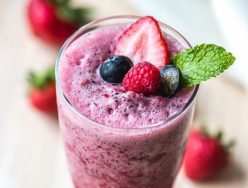Carbohydrates are a group of organic compounds made of carbons that include sugars, starches, celluloses, and gums. They serve as a major energy source in the diets of animals and humans. They provide fuel for aerobic and anaerobic activity. Carbohydrates provide sustained energy for aerobic activity and immediate energy for anaerobic or high-intensity activities. It is essential that long-distance runners and high-intensity athletes intake adequate carbohydrates before, during, and after activity. The appropriate amount will depend on the length and intensity of the activity. Carbohydrates are needed to burn fat and are metabolic primers. When you eat carbohydrates, they are released into your bloodstream, cause insulin to be released, and provide energy to the cells and the blood. This means that carbohydrates, taken in the right amount and in small amounts, can aid in weight loss as well.

Carbohydrates are divided into two categories of simple and complex. Simple carbohydrates are called simple sugars. The simple sugars or carbohydrates that you want to avoid are white sugars or candy. Simple carbohydrates such as those sugars found in apples and milk are good carbohydrate sources since they contain vitamins, fibers, antioxidants, and nutrients that are not naturally made by the body.
Complex carbohydrates are called starches. They include grain products such as crackers, pasta, bread, and rice. Vegetables and legumes also contain complex carbohydrates. To get the most from your complex carbohydrates opt for unrefined carbohydrates because they are rich in fiber, fill you up quickly, and have more vitamins and minerals. Fiber is only found in plant products and helps decrease your risk of colon cancer and cardiovascular disease and control diabetes. Refined carbohydrates contain fewer nutrients since they are taken out in the refining process. Dietary recommendations suggest that complex carbohydrates should make up 40-50% of your diet and simple sugars should make up 10% of your diet.
Carbohydrates are an essential part of your diet; they provide energy to fuel your daily activities, help prevent your body from using lean muscle tissue as an energy source, and protect muscle tone. There are many tasty and exciting varieties of carbohydrates for you to enjoy and items such as beans, legumes, and grains are inexpensive. Fruit, vegetables, and yogurts are convenient and don’t require time to prepare. So eat your carbs!- Christina Chapan
References
Carbohydrates
http://www.exrx.net/Nutrition/Carbohydrates.html
High Carb Low Carb
http://nutrition.about.com/od/fatscarbsproteins/a/whatiscarb.htm
Sweet Sweet Carbs
http://www.chem4kids.com/files/bio_carbos.html
Was this Article Helpful?
If this article was helpful to you, please consider linking this article to your own blog or sharing this through the social buttons below. You will also find other great articles at “Nutrition“.
- 1share
- 0Facebook
- 0Twitter
- 1Pinterest
- 0LinkedIn
Christina Chapan
Latest posts by Christina Chapan
- Body Language for Personal Trainers,Teachers and Group Instructors - January 12, 2020
- Allergies + Exercise: An Overview - January 9, 2020
- The Safety of Running Solo - January 5, 2020


















